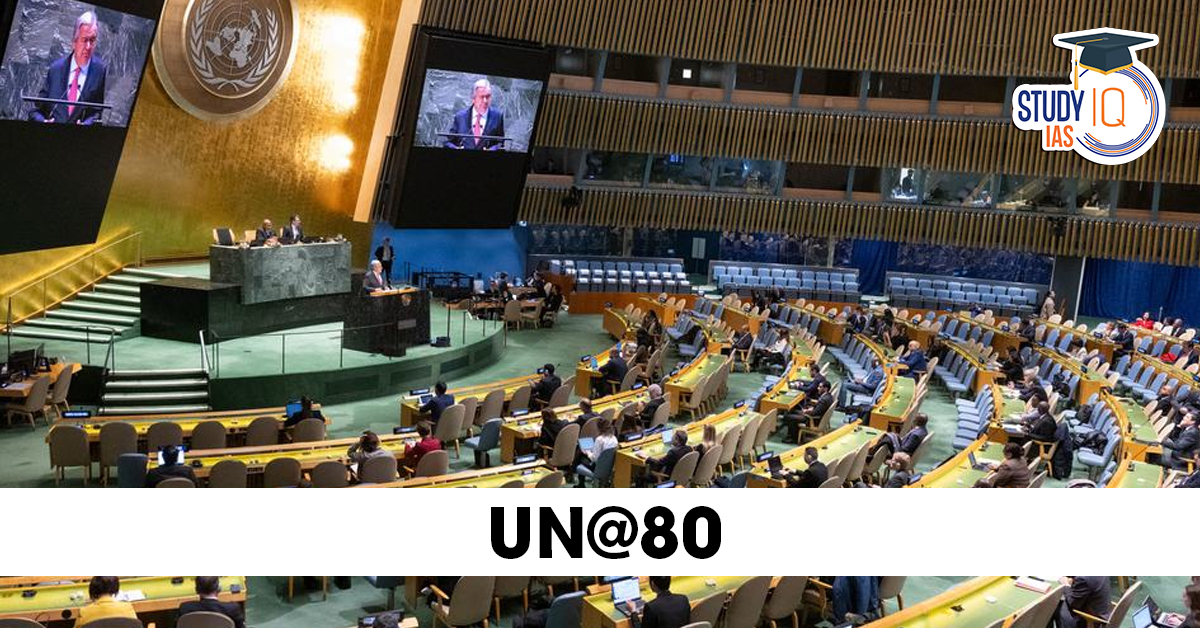Table of Contents
In 2025, the United Nations (UN) celebrates a historic milestone — 80 years of global leadership in peace, progress, and purpose. Born in the aftermath of World War II, the UN emerged as a beacon of hope for humanity, aiming to prevent conflict, promote cooperation, and ensure sustainable development for all. As the world reflects on eight decades of this international institution, the UN@80 celebration offers a moment to assess its remarkable achievements, enduring challenges, and evolving role in a rapidly changing global order.
Historical Origins: The Birth of Global Cooperation
The idea of a unified world body was conceived during the darkest days of the Second World War. On June 26, 1945, representatives from 50 nations gathered in San Francisco to sign the United Nations Charter, committing themselves to maintaining peace and fostering international cooperation. The Charter came into force on October 24, 1945, now observed annually as United Nations Day.
The UN started with just 51 member states and has now grown into a global family of 193 nations, symbolizing its universal representation. Its foundation rests on three key pillars:
-
Peace and Security
-
Human Rights
-
Development and Cooperation
Over 80 years, these principles have guided the organization’s mission to build a fair, inclusive, and peaceful world.
Eight Decades of Achievement and Impact
1. Guardian of Global Peace
One of the UN’s most defining roles has been as a guardian of global peace and security. Through peacekeeping operations in conflict zones, the organization has prevented violence, protected civilians, and facilitated post-war reconstruction. UN peacekeepers, often called the “Blue Helmets,” have served in over 70 missions across continents, embodying the spirit of global solidarity.
2. Champion of Human Rights
The adoption of the Universal Declaration of Human Rights (1948) marked a turning point in global governance. The UN has since worked tirelessly to combat discrimination, empower women, protect children, and uphold the rights of minorities and refugees. Human rights remain central to its identity and continue to shape international norms.
3. Catalyst for Development
The UN has been instrumental in driving development through programs like Millennium Development Goals (MDGs) and Sustainable Development Goals (SDGs). These initiatives address poverty, inequality, education, healthcare, and climate change — promoting a holistic vision of progress. The 2030 Agenda for Sustainable Development remains the UN’s roadmap for a better future.
4. Humanitarian Assistance and Health
Through agencies like the World Food Programme (WFP) and World Health Organization (WHO), the UN has responded to global crises — from natural disasters to pandemics. Whether it’s eradicating smallpox, providing food to war-torn regions, or coordinating COVID-19 recovery, the UN has stood at the forefront of humanitarian aid.
5. Environmental Leadership
In recent decades, the UN has become a leading voice in addressing the climate crisis. From the 1992 Earth Summit to the Paris Agreement, the UN has united nations to tackle global warming, biodiversity loss, and environmental degradation. Its efforts have pushed countries to adopt green policies and embrace renewable energy.
UN @ 80: A Moment of Reflection and Renewal
Marking 80 years of its existence, the UN stands at a crossroads. While it remains the world’s most important platform for multilateral cooperation, it faces growing challenges — geopolitical rivalries, inequality, digital divides, and the existential threat of climate change.
The UN@80 initiative symbolizes a commitment to modernization, accountability, and relevance in the 21st century. It emphasizes reforming institutions, improving decision-making processes, and adapting to new global realities like artificial intelligence governance, cyber security, and sustainable technology.
Key Challenges for the UN@80 Era
-
Reforming the UN Security Council to reflect the modern balance of power.
-
Revitalizing multilateralism in an era of rising nationalism and regional blocs.
-
Accelerating progress on climate and sustainability goals.
-
Strengthening global health systems post-pandemic.
-
Promoting digital inclusivity and ethical AI governance.
India and the United Nations: Partners in Global Progress
India has been a key contributor to the UN’s mission since its inception. As a founding member, India has championed peacekeeping, decolonization, and multilateral diplomacy.
India’s Major Contributions
-
Peacekeeping: India is one of the largest contributors of troops to UN peacekeeping missions, with personnel serving in conflict zones across Africa and the Middle East.
-
Global South Voice: India advocates for the concerns of developing nations, emphasizing equity in climate finance, trade, and technology transfer.
-
Sustainability Leadership: Initiatives like the International Solar Alliance (ISA) align with the UN’s SDG framework, showcasing India’s leadership in renewable energy.
-
UN Reforms: India continues to push for a permanent seat on the UN Security Council, asserting that global governance structures must evolve to reflect 21st-century realities.
As the UN celebrates its 80th anniversary, India’s role as a responsible global power has never been more vital — bridging North-South divides and promoting a multipolar, cooperative world order.
The Road Ahead: Reimagining the UN for a New Era
The next decade will be crucial for shaping the UN’s relevance. As the world faces complex, interconnected challenges — from AI-driven economies to climate-induced migration — the need for a revitalized and inclusive multilateral system has never been greater.
Future Priorities for the UN
-
Peace Through Dialogue – Expanding preventive diplomacy to stop conflicts before they start.
-
Empowering the Youth – Engaging the next generation in global decision-making.
-
Greener Future – Accelerating commitments to achieve net-zero emissions.
-
Digital Equity – Bridging the global digital divide and regulating emerging technologies.
-
Inclusive Global Governance – Ensuring fair representation and accountability across all UN bodies.
At 80, the UN’s challenge is not survival — but renewal. It must reinvent itself to remain a credible force for collective action.
Conclusion
As the United Nations turns 80, it stands as a living testament to humanity’s enduring belief in peace, cooperation, and shared progress. From the ashes of war to the promise of sustainable development, the UN has shaped the modern world’s moral and political landscape.
Yet, the journey is far from over. The challenges ahead — climate change, inequality, digital disruption — demand stronger multilateralism, bold reforms, and renewed commitment. For nations like India and the global community at large, UN@80 is not merely a celebration of history, but a call to action — to rebuild trust, reaffirm unity, and work together for a just, secure, and sustainable world.


 Effectiveness of Tobacco Taxation in Ind...
Effectiveness of Tobacco Taxation in Ind...
 Private Sector Participation in Defence ...
Private Sector Participation in Defence ...
 India–France Strategic Cooperation in ...
India–France Strategic Cooperation in ...




















